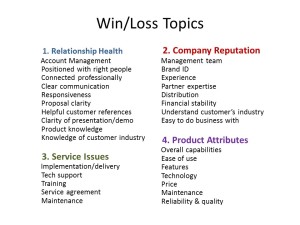I just had another client tell me he was getting pushback from his salesforce to do Win/Loss analysis. They felt threatened by what the output might be. They felt that win/loss analysis would be a critique of them, and only them. Really!? The objective of Win/Loss analysis is to win and retain more business, not to critique sales people.
To strengthen this argument, I share the 4 topical areas we cover in the Win/Loss interviews with the company’s customers and those who chose a competitor:
- Relationship Health
- Company Reputation
- Service Issues
- Product Attributes
When you look at the detail under each of these 4 topical areas, only #1, Relationship Health is primarily a Sales’ assessment. The other three are NOT assessing Sales, and they are just as important to helping companies win and retain more business.
Another way to help dispel the salesforce’s belief that Win/Loss just targets them is to share the strategic benefits that companies gain from Win/Loss. How could this be if we only assessed the salesforce?
Here is a list of 15 strategic benefits from doing Win/Loss analysis:
- Which industry segments do and don’t like your solutions.
- What business to walk away from.
- Which business sweet spots to strengthen.
- New business opportunities.
- New competitors, entering from industries different from yours.
- Strategic partners or acquisition candidates.
- Geographic markets to enter or exit.
- How to improve your product or service mix.
- Unintended product uses.
- New product and service developments.
- Improved revenue forecasts.
- Sustainable ways to increase profits and revenues.
- Trends working against competitors.
- Knowledge of disruptive changes before they hit the market or better yet, how to become a disruptor yourself.
- Fuel for strategic planning.
I hope these ideas and approaches help you get your salesforce to understand two things:
Win/Loss is not a critique of the salesforce. That’s your company’s management’s job! Win/Loss analysis’ objective is to learn how to win and retain more business—both in the short term and over time.
Actually, your salesforce is the biggest beneficiary of Win/Loss analysis since your salesforce’s goal parallels the goal of Win/Loss analysis: to win and retain more business. Win/Loss lets your customers and prospects enlighten you from their entire buying experience with your company…and the competition.
BTW, research indicates that companies who act from a formal Win/Loss program can improve business win rates anywhere from 15 to 30%. Can you afford not to be doing Win/Loss analysis?
Here are some resources on Win/Loss:
Win/Loss Analysis: definition, presentation, etc.
Win/Loss Analysis book; Amazon link to Win/Loss Analysis book
Join our mailing list and get our cheat sheets on “How to Build a World Class Win/Loss Program.”
Connect on LinkedIn Connect on Twitter
Filed under: Denver, Ellen Naylor, win loss analysis | Tagged: win loss analysis | 1 Comment »



